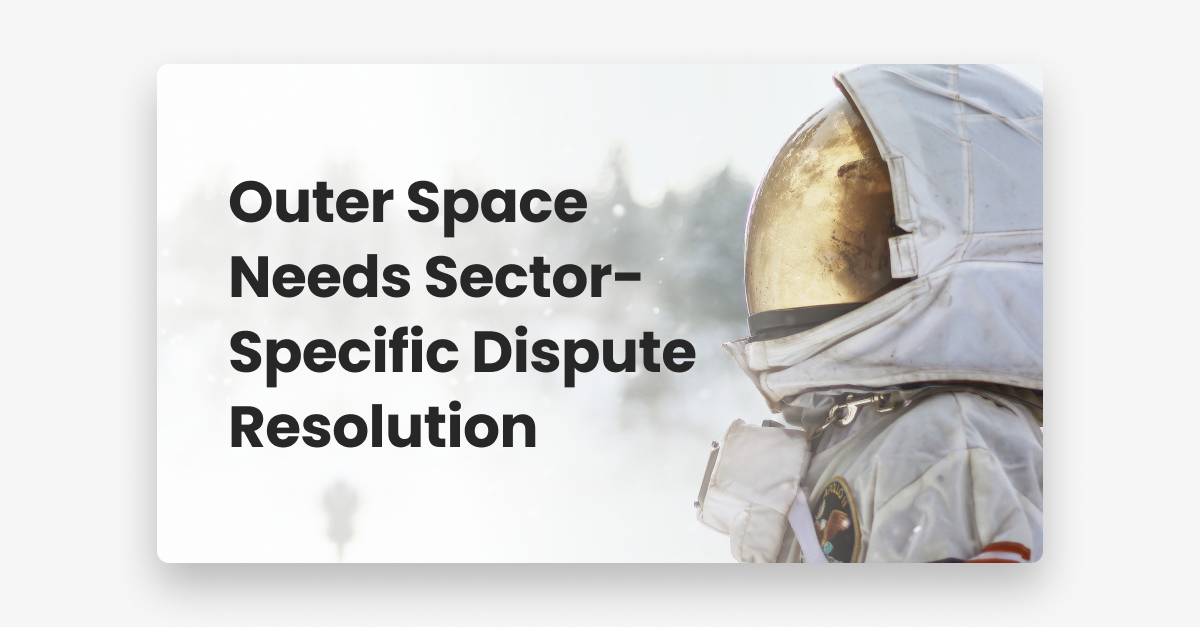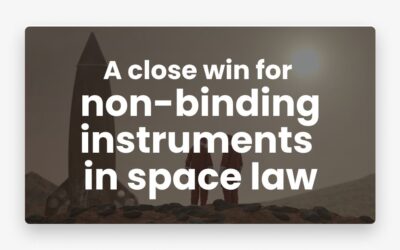Outer Space Needs Sector-Specific Dispute Resolution
By Luca Erhart
On 10 February 2022, the Space Arbitration Association (‘SAA’) hosted a discussion, surrounding the need for an institution specialized in space disputes. It concluded that outer space needs sector-specific dispute resolution. The panel was moderated by Laura Yvonne Zielinski, Founder of the SAA, and featured Alexis Mourre (Past President, ICC Court), Gunjan Sharma (Partner, Volterra Fietta), Evgeniya Goriatcheva (Senior Legal Counsel, Permanent Court of Arbitration), and Amna Al Owais (Chief Registrar, DIFC Courts). It was the second of a 2022 conference series organized by the recently founded SAA, which has set as its mission to provide a forum for discussion between the space and the arbitration communities.
Special Characteristics of Space Contracts and Disputes
The conference kicked off with the first speaker, Alexis Mourre, who introduced the audience to some of the special characteristics inherent in space contracts and space disputes. He started by setting out the circumstances that can give rise to space disputes in the first place. They can range from accidents in the final stages of testing and commissioning of a satellite or total launch failures, to the incorrect positioning of a satellite, the interruption of transmissions or the loss of power, once a satellite is already in orbit. The disputes that arise could therefore be based on a wide range of contracts, including procurement, launch, and/or insurance contracts.
Alexis Mourre noted that whatever the cause of the problem, space contracts and disputes tend to share common characteristics. The first one is the allocation of risk, a result of the technologically intensive nature of conducting operations in outer space. This often results in practice in clauses excluding or limiting liability. For example, in procurement contracts, this typically takes the form of penalty clauses, which in the case of delayed delivery operate as a cap on a manufacturer’s liability. He emphasized that one key consideration for space contracts must be the choice of the legal regime as this determines whether clauses that exclude liability can, for example, be set aside in cases of gross negligence, and whether a limitation of liability can be increased on an equitable basis when certain conditions are met.
Another very common feature of procurement contracts that Alexis Mourre pointed out are provisions of cooperation between the manufacturer and the seller, as well as the purchaser’s access to information. Typically, procurement contracts allow for the presence of representatives of the purchaser in the manufacturing plant; the organization of joint meetings; regular reporting requirements; and joint decision-making on key issues. These considerations are critical from a purchaser’s perspective since in case of an accident, clauses excluding or limiting the liability of the manufacturer may apply, and the manufacturer would typically rely on an internal investigation, the records of which may not be shared with the purchaser. Any level of control during the manufacturing process is thus key for the purchaser. Further, in Alexis Mourre’s experience, the choice of dispute resolution can also be very important. Arbitration usually only permits disclosure of a narrow category of documents, whereas American court litigation may permit access to court discovery, resulting in much broader access to information. Overall, Alexis Mourre still considered that arbitration was more suited to space disputes than litigation for the main reason that it allows the parties to a dispute to select arbitrators with the necessary technical knowledge of space activities. In his view both, the ICC and arbitration under the Optional Rules for Space Disputes of the Permanent Court of Arbitration (“PCA”), are an excellent choice for institutional space arbitration.
Laura Yvonne Zielinski then asked the panelist several related questions. First, why arbitration is particularly well suited to space disputes, Alexis Mourre provided three reasons: (1) in arbitration, once a matter is decided, that decision is final and can be enforced relying on the New York Convention; (2) in arbitration, the parties will have the advantage of being able to choose specialized arbitrators with experience in the field; and (3) in arbitration, the parties will have greater control over, and thus greater proximity to, the process as a whole. Second, whether mainstream arbitral institutions are well placed to administer space arbitration proceedings. Alexis Mourre replied that in his view what is important is to have space experts as decision-makers and the administering institution should have the necessary experience and resources to appoint such arbitrators if required. Third, whether mediation might have a place in resolving space disputes. Alexis Mourre noted that this would in principle be very desirable since many litigated issues are technical in nature – if only to see whether positions on such issues can be reconciled, or to go to arbitration in a more balanced and informed way. Nonetheless, in his view it is crucial for the mediator to have knowledge of the industry, and the importance of drafting a clear mediation clause cannot be underestimated.
Special Considerations When Pleading Space Evidence to Arbitral Tribunals
Gunjan Sharma continued the discussion by setting out considerations for pleading evidence in space related disputes to arbitral tribunals. In his opinion, there have only been three space arbitrations in excess of USD 100 million: Eutelsat v Mexico; Devas/Deutsche Telekom v India; and Al Jazeera v Egypt. He highlighted that, when pleading such cases to arbitral tribunals, there exist two unique aspects. First, an important source of law in space disputes is public international law, such as the Outer Space Treaty and related instruments, and international investment law. The second unique aspect is the recurring technical evidence, which relates to two aspects of space operations: (1) getting the satellite into outer space, and (2) after the launch, the scientific basis on which that satellite can be used for commercial purposes. Currently satellites are used for two main purposes: Earth imaging and telecommunications. The science, such as the usability of orbital spectrum, the orbital slot, or the terrestrial components of the system, are mere ingredients determining how much money can be pulled out of the system and, relatedly, how much damage one can claim in a dispute. As a result, scientific evidence really becomes the core of space disputes.
Since “lawyers make bad engineers”, Gunjan Sharma therefore recommended to take a five-step approach to pleading space-related scientific evidence before arbitral tribunals: (1) Advise client(s) to prepare for a dispute as early as possible: a lawyer should have plans and procedures in place, such as those concerning evidence collection and making sure that documents are at all times retained; (2) Find the right, neutral expert: a lawyer should know someone who can refer him/her to the right experts for the case (from the International Telecommunications Union, regulators, companies, etc.). An arbitral institution’s list is a good start but the best method is to rely on referrals; (3) Make comprehensive submissions on every aspect of the case (including public international law); (4) Find the right way to cross-examine the other side’s expert: a lawyer should start early to frustrate the other expert’s credibility before the hearing, given the unique challenge of the engineer’s expertise and the tribunal’s likely non-comprehension of the issues; (5) Close well: a lawyer should close in an accurate, concise, and commonsensical way, since tribunal members are not space experts after all.
In response to the question formulated by Laura Yvonne Zielinski on what the best strategy was to explain space law to the arbitral panel, Gunjan Sharma noted that it is necessary to link it to what the tribunal knows, such as public international law. Moreover, on the so-called “name and shame” method to litigation (which involves telling the world who did the damage and hope they stop), he observed that he does not recommend it, since: (1) often there is a lack of evidence to prove the allegations; and (2) if you are wrong, this could possibly result in a defamation suit.
An Introduction to a Mechanism of Space Arbitration: The PCA’s Optional Rules for Arbitration of Disputes Relating to Outer Space Activities
Evgeniya Goriatcheva then proceeded to introduce one of the available specialized instruments for dispute resolution in the space sector: the Permanent Court of Arbitration’s Outer Space Rules (the “Rules”). She highlighted that the Rules were adopted in 2011, the idea having first surfaced in 2009 as a result of: (1) the growing potential for disputes from the commercialization of space, involving a variety of actors; (2) the existence of gaps in existing dispute resolution mechanisms, especially for private actors; and (3) the lack of appetite by States to ratify a treaty, which became clear after the failure of the International Law Association’s 1998 Draft Convention for the Resolution of Space Disputes. The Permanent Court of Arbitration thus envisaged that a way to move forward was to make available a different set of arbitration rules, the use of which would depend on the consent of the parties to any given dispute. Evgeniya Goriatcheva noted that this involved collaboration with an expert group of 13 leading experts in aerospace law, who considered that the instrument would have to be international, accessible to both public and private actors, and should be able to deal with very high demand. They also thought that arbitration was the right mechanism to go for, since: (1) arbitration is available to all parties that are active in the space sector: (2) arbitration is a voluntary mechanism: (3) arbitration results in final and binding decisions: (4) arbitration allows parties to choose their own decision-makers: and (5) arbitration ensures confidentiality of sensitive information.
Evgeniya Goriatcheva set out key aspects of the content of the PCA’s Outer Space Rules, noting that they are based on the 2010 UNCITRAL Rules, with some departures to address the peculiarities of space disputes. First, she noted that the Rules alert the parties that by agreeing on an arbitration under the Rules, parties waive their immunity from jurisdiction (but not from execution). Second, to address some of the technical and scientific complexities, the Secretary General of the PCA has been empowered to create a list of arbitrators and experts proposed by Member States, the use of which is optional. Moreover, whenever the tribunal thinks its own knowledge is insufficient, it can appoint a technical expert, and/or request the parties to provide non-technical explanations. Third, she observed that the Rules also suggests several mechanisms for the protection of confidential information. Evgeniya Goriatcheva then addressed the PCA’s role under the Rules themselves, noting for example that the International Bureau of the PCA would be administering the cases, and that the Secretary General of the PCA is the appointing authority, which gives him the responsibility of, upon request, appointing, replacing, and deciding challenges against, arbitrators.
In reply to Laura Yvonne Zielinski’s question of whether the PCA’s Rules are available to all or just to States, Evgeniya Goriatcheva emphasized that all kind of actors have access to the rules: the dispute can be between private parties, between private parties and a State, or even between two States. Moreover, she noted that the feedback they had received on the Rules was overall very positive, and that they receive regular inquiries, with some actors having already included the Rules in their contracts, although there has been no dispute under the Rules yet. Finally, on whether it would be desirable to establish an international space tribunal, Evgeniya Goriatcheva responded that it could provide a more effective remedy for private parties against States than the PCA, which requires parties’ consent. But the problem here is one of political will, or rather the current lack thereof.
An Introduction to a New Mechanism of Space Litigation: The DIFC Courts
Finally, Amna Al Owais introduced viewers to the DIFC Courts, in particular the Dubai Space Courts’ Initiative. She first provided an introduction to the Courts, highlighting that they form part of the Dubai International Financial Centre and were created with the underlying rationale of creating confidence in the domestic legal system, thus inviting companies to come to the United Arab Emirates. The Courts are international in nature working in English and following the common law approach, although based in a civil law country. They handle civil and commercial cases, and since 2011, they are a “forum of choice” and are thus open to any party, and can apply any (common) law the parties have chosen in their contracts. The Courts are moreover based on four primary pillars: (1) judicial excellence; (2) service excellence; (3) connectivity; and (4) innovation. Amna Al Owais emphasized that the DIFC Courts are one of the most connected courts in the world, with all common law jurisdictions honoring their judgments, and the added benefit of being able to enforce all the treaties the United Arab Emirates (“UAE”) have entered into internationally.
Amna Al Owais then turned to the Courts of Space Initiative, which officially commenced in 2021, and forms part of the broader Courts of the Future Initiative the Centre had started in 2017. She set out the three-step strategy that the Centre pursues to become the new and best forum of choice for future space disputes: (1), they are attracting thought leaders in space from various career paths, such as lawyers; representatives of space agencies; and observers from the UN Space Office; (2), they are thinking about what types of disputes could occur in the future, moving away from more traditional ones, such as satellite collisions. Amna Al Owais highlighted that they created a special disputes’ guide, the first edition of which sets out the types of procedures that one must follow in filing a case with the DIFC Courts, and the second edition of which will look at what is likely to happen in outer space and the disputes this will likely give rise to (such as, those arising from future Moon and Mars explorations); (3), they are providing a training series for registry staff and judges on the subject matter of outer space, including on the existing international space treaties.
When asked by Laura Yvonne Zielinski why Dubai is the right place for space dispute resolution, Amna Al Owais responded that: (1) Dubai has recently focused a lot on outer space activities, with successes such as the first UAE astronaut and the first Mars mission, and the Courts are thus supporting the UAE indirectly, providing the certainty commercial parties need; and (2) the Dubai Courts operate in a unique manner, the primary objective being to provide for dispute settlement before going to trial. She concluded that its connectivity approach means that it can provide the best of two worlds, being a civil law country but operating in common law.
Concluding Remarks
At the end, Laura Yvonne Zielinski asked the panelists some of the questions that had been asked by members of the public throughout the event. The first question addressed the law that would be applicable to disputes arising out of space collisions. In response, Gunjan Sharma pointed out that, in principle, it would be the Liability Convention, which provides that the launching State is liable for damage caused to another State or its nationals, if at fault. The second question asked what made the PCA Rules so different from other arbitration rules. Evgeniya Goriatcheva responded that, to start with, the whole point of the Rules was to provide for consistency and predictability and hence they were never meant to be too different from existing arbitration rules. However, they were tweaked to respond to the heavy State involvement and very technical aspects of space disputes.
You might also like
Investment Protection and Space Investors
Investment Protection and Space Investors By Luca Erhart and Riccardo LoschiInvestment Protection...
A close win for non-binding instruments in space law
A close win for non-binding instruments in space law By Ruvimbo Samanga"A close win for...
Space Arbitration: Protecting Space Investments
Space Arbitration: Protecting Space Investments By Katie MakSpace Arbitration: Protecting Space...


